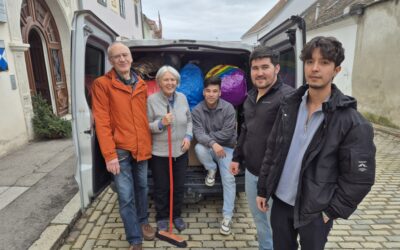 The time dedicated to political reflection last March 22 in Martigny (Switzerland) took on particular importance in view of the world situation, and in particular in view of the war in Iraq. This point was underlined by the Mayor of Mollens, Stéphane Pont, moderator of the convention which was entitled: “The challenge of authentic politics.” Promoted by a group of mayors, the Convention aroused the interest of a surprising number of politicians; in fact, there were 300 participants, among whom were politicians working on the national, regional and municipal levels from all over Switzerland. There were also participants from France and Austria, as well as a delegation from the World Council of Churches in Geneve (WCC). “In our days, politics is extremely demanding. Today we were presented with a political vision which may be a bit idealistic – commented Kipa Christophe Darbellay, member of the administration of the Federal Office of Agriculture – but I believe that it is important to have idealistic goals and perspectives also in political life. The best propeller of political commitment is a solid relationship with other people and with God. This was what we have seen today.” Chiara Lubich was invited as the keynote speaker. In her talk, she proposed that brotherhood be assumed as a political category, since this is ever more urgent now, with the present dramatic international scene. “In its essence, politics is love – she stated – and it renders as necessary the development of mental categories which take into account the fundamental unity among human beings, while conserving full respect for their differences.” She concluded by launching a challenge to Switzerland: “Being a small country, it could become for Europe a model of unity in the diversity of cultures and languages.”
The time dedicated to political reflection last March 22 in Martigny (Switzerland) took on particular importance in view of the world situation, and in particular in view of the war in Iraq. This point was underlined by the Mayor of Mollens, Stéphane Pont, moderator of the convention which was entitled: “The challenge of authentic politics.” Promoted by a group of mayors, the Convention aroused the interest of a surprising number of politicians; in fact, there were 300 participants, among whom were politicians working on the national, regional and municipal levels from all over Switzerland. There were also participants from France and Austria, as well as a delegation from the World Council of Churches in Geneve (WCC). “In our days, politics is extremely demanding. Today we were presented with a political vision which may be a bit idealistic – commented Kipa Christophe Darbellay, member of the administration of the Federal Office of Agriculture – but I believe that it is important to have idealistic goals and perspectives also in political life. The best propeller of political commitment is a solid relationship with other people and with God. This was what we have seen today.” Chiara Lubich was invited as the keynote speaker. In her talk, she proposed that brotherhood be assumed as a political category, since this is ever more urgent now, with the present dramatic international scene. “In its essence, politics is love – she stated – and it renders as necessary the development of mental categories which take into account the fundamental unity among human beings, while conserving full respect for their differences.” She concluded by launching a challenge to Switzerland: “Being a small country, it could become for Europe a model of unity in the diversity of cultures and languages.”
 Lucia Fronza Crepaz, former Italian Congresswoman, spoke about the developments in the Movement for Unity in Politics, which began in 1996 with the aim of encouraging political commitment and democratic debate in the perspective of serving the common good; the Movement also underscores those aspects of political action which contribute to successfully working for the common good and for universal brotherhood.” This new political culture was demonstrated by the concrete examples shared by numerous politicians. The report presented by Marco Fatuzzo, former Mayor of Syracuse (Sicily) was particularly significant. He related how majority and opposition forces were able to collaborate to the benefit of the citizens, during a particularly difficult situation.
Lucia Fronza Crepaz, former Italian Congresswoman, spoke about the developments in the Movement for Unity in Politics, which began in 1996 with the aim of encouraging political commitment and democratic debate in the perspective of serving the common good; the Movement also underscores those aspects of political action which contribute to successfully working for the common good and for universal brotherhood.” This new political culture was demonstrated by the concrete examples shared by numerous politicians. The report presented by Marco Fatuzzo, former Mayor of Syracuse (Sicily) was particularly significant. He related how majority and opposition forces were able to collaborate to the benefit of the citizens, during a particularly difficult situation.




0 Comments